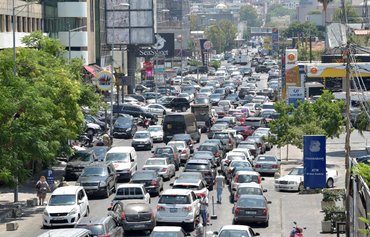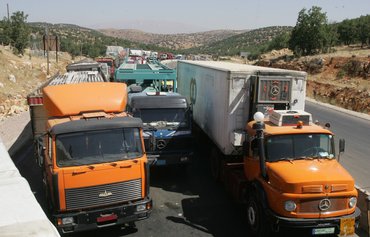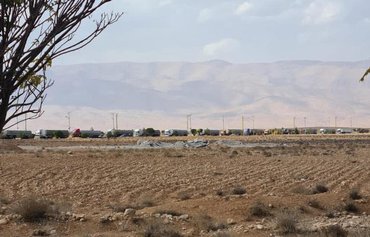BEIRUT -- The Lebanese Armed Forces (LAF) have intensified their presence in the Bekaa Valley in an effort to curb smuggling activity between Lebanon and Syria, amid an uptick in cross-border trafficking activity, military sources said.
The army has established a stronger presence on the country's northern border, north from Hermel to al-Abda, in response to a surge in the smuggling of goods and fuel to Syria through illegal crossings, they said.
The LAF have taken a firmer stance against smugglers after Sgt. Mohammed al-Husseini of the Land Border Force was killed in clashes with smugglers on the northern border with Syria on August 13.
There has been a marked increase in the smuggling of commodities to Syria as Lebanon's economic crisis has deepened, sources said.
![The Lebanese army is intensifying border patrols in the Bekaa Valley as Hizbullah steps up smuggling. Smuggling activities go in both directions across the border and are part of the way Hizbullah controls Lebanon's economy. [Ziad Hatem]](/cnmi_am/images/2022/09/05/36869-laf_3-600_384.jpg)
The Lebanese army is intensifying border patrols in the Bekaa Valley as Hizbullah steps up smuggling. Smuggling activities go in both directions across the border and are part of the way Hizbullah controls Lebanon's economy. [Ziad Hatem]
![There are about 161 legal and illegal border crossings between Lebanon and Syria, and the LAF are stepping up efforts to curb smuggling activity between the two countries. [Ziad Hatem]](/cnmi_am/images/2022/09/05/36870-laf_4-600_384.jpg)
There are about 161 legal and illegal border crossings between Lebanon and Syria, and the LAF are stepping up efforts to curb smuggling activity between the two countries. [Ziad Hatem]
The public is struggling financially with the constant rise in prices, and the national currency is continuing to lose its value against the US dollar.
Expanding their activities on the Lebanese-Syrian border, smugglers are now trafficking fuel, vegetables, livestock, bread, cigarettes and medical devices into Syria via expanded routes, Asharq al-Awsat reported August 11.
Smuggling activity has proliferated in uninhabited areas such as Yanta and Wadi al-Ashaer, it said.
New illicit trade routes include the Beit Jinn axis in the south, through the eastern Lebanon mountain range; Qoussaya and Ain Kfar Zabad in the central Bekaa Valley; and from Nahleh and Arsal up to the northern Bekaa.
Smuggling subsidised goods
Smuggling activity increased in Lebanon after Syria lifted its fuel subsidies, an LAF official told Al-Mashareq, asking that his name not be used.
The Lebanese army is working to control the border and limit smuggling via security measures such as adding checkpoints and enforcing tighter border control in the Bekaa Valley, he said.
According to Tripoli municipality finance committee chairman Ahmed Badawi, Lebanon's borders with Syria are riddled with holes.
This has enabled smugglers to move large quantities of commodities between Lebanon and Syria, he said, in trades worth hundreds of millions of dollars.
"It is unfortunate that wheat and fuel are smuggled before our eyes, and we know who is responsible," he said.
Subsidised goods from Lebanon are smuggled into Syria, he said, and the shortage of these goods forces the Lebanese public to pay several times more than the subsidised prices.
He called on the Lebanese judiciary to take action against smuggling by enforcing punitive damages against those who engage in such activity.
Illegal border crossings
Journalist Sawsan Muhanna said Hizbullah media official Mohammed Afif once told her in an interview that "smuggling is as old as the Lebanese and Syrian states".
Some individuals "make a living out of smuggling", Afif told her.
Smuggling activities go in both directions across the border and are part of the way Hizbullah controls Lebanon's economy and circumvents the sanctions imposed on the party, Muhanna said.
Hizbullah smuggles Turkish, Iranian and Iraqi goods into Lebanon through the Syrian port of Latakia, she said, adding that the majority of the merchants who benefit from the illicit trade are Hizbullah-affiliated individuals.
Despite the demands of the international community and the World Bank, she said, Hizbullah's control over Lebanon's border with Syria has not been contained.
"As long as the smuggling continues, Syria will continue to circumvent the Caesar Act sanctions," she said, noting that there are about 161 legal and illegal border crossings between Lebanon and Syria.
Many of these are controlled by local tribes "protected by Hizbullah", she said.
The LAF have been carrying out raids in areas of rugged terrain used by smugglers, but these areas are difficult to control, Muhanna said.
Hizbullah has been disrupting the LAF's efforts to combat trafficking, including human trafficking, from and into Syria, she said.

![The Lebanese Armed Forces (LAF) have intensified their presence in the Bekaa Valley in an effort to curb smuggling activity between Lebanon and Syria. [Ziad Hatem]](/cnmi_am/images/2022/09/05/36867-laf_1-600_384.jpg)






